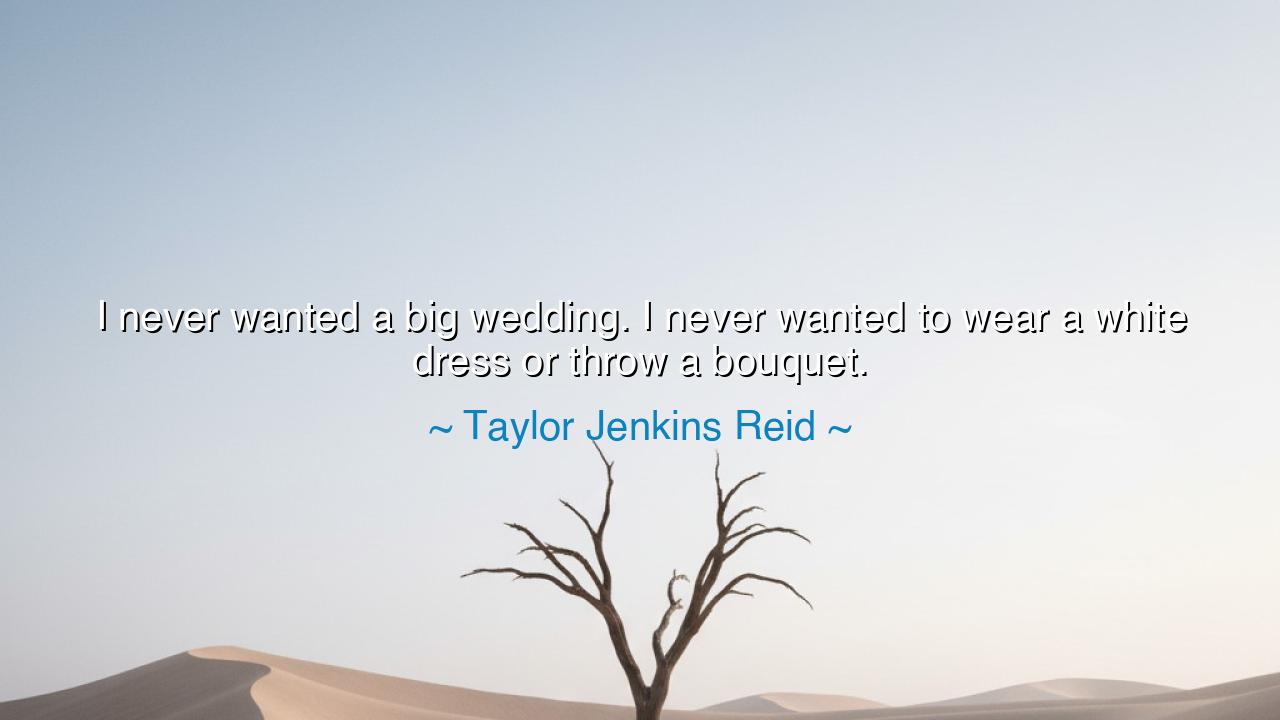
I never wanted a big wedding. I never wanted to wear a white






In the words of Taylor Jenkins Reid, we hear the voice of one who sought truth over tradition. She declares, “I never wanted a big wedding. I never wanted to wear a white dress or throw a bouquet.” In this confession lies the courage to resist the expectations of society, to stand apart from the rituals that have become customary. She teaches us that love need not be proven by spectacle, nor sanctified by garments and gestures, but is holy in its own right when chosen with sincerity.
The ancients, too, knew that not all unions required grandeur. In Sparta, weddings were simple, often held at night, with no lavish feasts or ornate gowns. The essence was the bond itself, not the display. So Reid’s rejection of the big wedding echoes a wisdom older than crowns and churches: that marriage is not strengthened by pageantry, but by the depth of commitment. White dresses and bouquets may please the eye, yet they are symbols, not substance.
Her words also teach the lesson of individuality. To cast aside the white dress is to refuse the illusion of purity demanded by tradition, and to claim instead the authenticity of self. To decline the bouquet toss is to deny the performance of custom, where the bride’s joy is staged for the crowd. Reid’s vision reminds us that one’s love story need not be staged for others; it must be lived for the two who vow to walk it together.
History gives us reflection in the life of Queen Victoria, who popularized the white wedding dress. Though her choice was personal, it grew into an empire-wide tradition, binding countless women after her to an image that was never their own. Reid’s words are a quiet rebellion against this inheritance, a reminder that no tradition, however venerable, must enslave the heart. True power lies in shaping one’s own ceremony according to truth, not expectation.
Therefore, let this teaching endure: the sacredness of marriage lies not in the size of the feast, nor the whiteness of the dress, nor the flight of the bouquet, but in the vow whispered between two souls. To resist the pressure of tradition is itself a heroic act, for it is the defense of authenticity against conformity. Reid’s words remind all generations that love is not measured in pageantry, but in honesty—and that the simplest of unions, if chosen freely, shines brighter than the grandest of illusions.






MLMary Liliam
It’s refreshing to hear Taylor Jenkins Reid’s take on weddings, where she embraces a more personal and minimalist approach. It really makes me wonder: how often do people feel forced to fulfill the wedding ideals set by others? How much can we truly personalize a wedding while still meeting the expectations of our families or society?
NLNa Le
Taylor Jenkins Reid’s approach to weddings challenges the traditional norms many people feel obligated to follow. It’s fascinating how she opts out of the big wedding and white dress culture. Do you think there’s a growing movement to personalize weddings, or do people still feel pressured to conform to certain standards for the sake of tradition or family expectations?
TPThao Phuong
Taylor Jenkins Reid’s quote highlights how personal and meaningful a wedding can be, without all the societal pressure. It’s interesting that she didn’t want a big wedding or to wear a traditional dress. What do you think drives people to go along with what’s 'expected' at weddings? Is it possible to still have a memorable, special wedding without following these typical customs?
MTVu Minh Tri
I really relate to Taylor Jenkins Reid’s perspective on weddings. There’s so much expectation surrounding the big wedding day—like the white dress and bouquet toss—that it’s nice to hear someone speak out against those conventions. Why do so many people feel that they have to follow certain traditions? How do you feel about making your wedding day uniquely yours, without adhering to societal expectations?
QMQuan Minh
Taylor Jenkins Reid’s take on weddings is refreshing, especially in a world where so much emphasis is placed on the grandeur of the event. It makes me think: How often do people feel pressured to conform to traditional wedding norms like wearing a white dress or having a big ceremony? Is there a way to honor personal preferences without feeling like you’re disappointing others or breaking tradition?